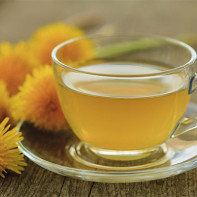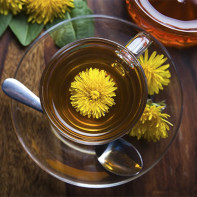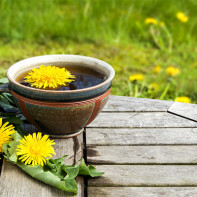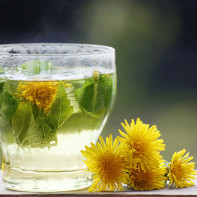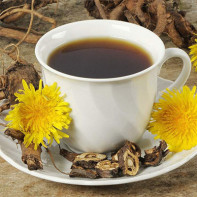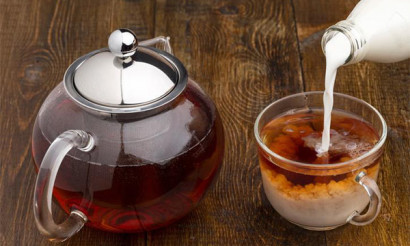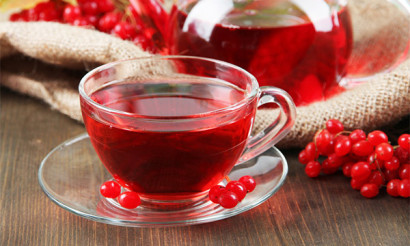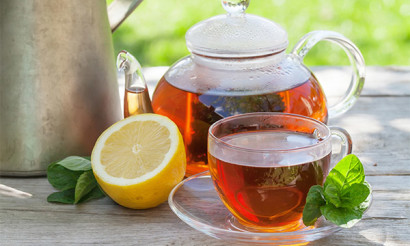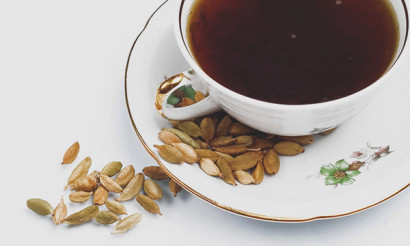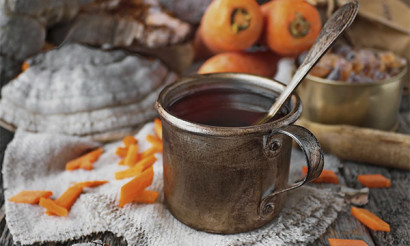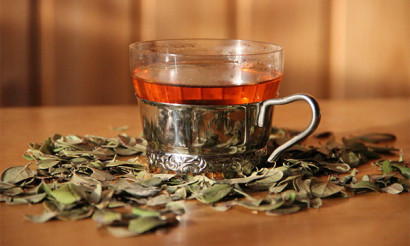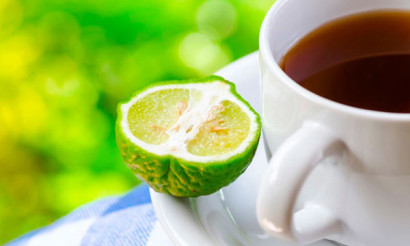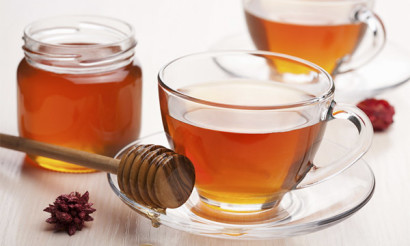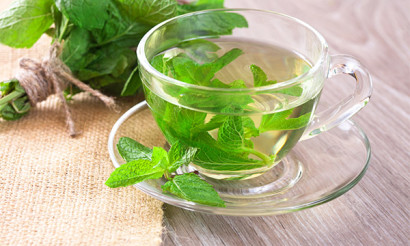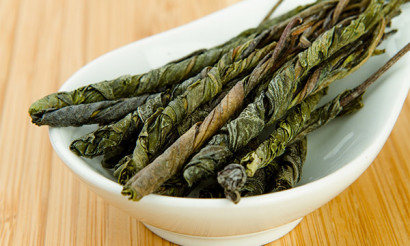Dandelion tea: useful properties and contraindications
Dandelion is a perennial herbaceous plant that grows extensively in Russia. The official name of the plant is Taraxacum, derived from the Arabic or Persian name of the flower "taruhshakun". You can also often hear its folk name: thistle, soldier, cow flower, milky flower, parachute.
- Composition and calories
- Useful properties of dandelion tea
- Overall Benefits
- For women
- For men
- In Pregnancy
- For breastfeeding
- For children
- Slimming
- How to drink for different problems
- Harm and contraindications
- When and how to harvest dandelion for tea
- How to cook dandelion tea: recipes
- Interesting facts about dandelions
If we consider the properties of the dandelion from a medical point of view, it has numerous properties - general tonic, choleretic, diuretic, antimicrobial, blood purifying and antipyretic effect. During the flowering period is used extensively in cooking.
Composition and calories
There are about 45 calories in 100 grams of dandelion greens.
The flowers of the plant include a carotenoid, which is useful for the eyesight of adults and children (the bitterness is formed by taraxanthin, lutein, flavoxanthin), triterpene alcohol (arnidol, faradiol), volatile oils, inulin, tannins, vitamins A, B1, B2, C, protein, iron, potassium.
Dandelion rhizome includes a large number of elements: inulin, amirin, taraxerol, tannins, potassium, choline, vitamins A, B1, C, D, fatty oil, melissa and linoleic acids, organic resins.
Useful properties of dandelion tea
General benefits
This plant is used in folk medicine for the following diseases:
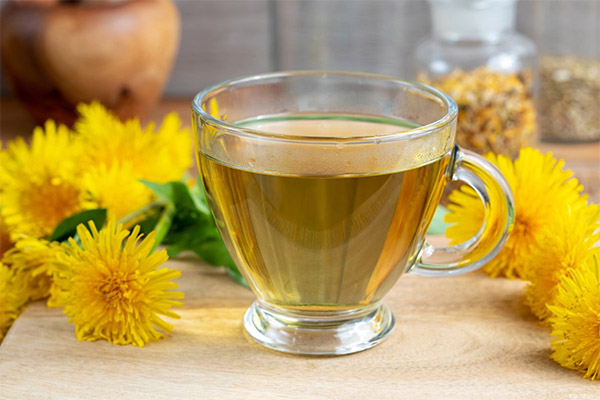
- Diseases of the joints. Because of its blood-purifying properties, it is ideal for the treatment of arthritis, seasonal rheumatic pains. Tincture of dandelion is used internally, as well as a rubbing or compresses.
- Metabolic disorder. The constant intake of tea increases the production of insulin in the body, helps to regulate carbohydrate, lipid metabolism. Recommended for use in diabetes, thyroid problems, for weight loss and lowering cholesterol.
- Blood purifying effect. Due to the presence of inulin in the plant, collections including dandelion are used for detoxification of the body, with poisoning. Inulin absorbs toxins, toxins, heavy metals, radionuclides and painlessly removes them from the body. Infusion of the herb is used to treat lymph nodes.
- Digestive system of the gastrointestinal tract. Dandelion drink has a good effect on the intestinal function when digestion is impaired, after antibiotic treatment. Medicinal gatherings are used for pancreatitis, gastritis, flatulence, constipation, colitis and kidney stones.
- Respiratory diseases, cold ailments. Due to the diaphoretic, antipyretic effects of the plant, the infusion can be used when the temperature increases, during respiratory diseases. With pulmonary tuberculosis has a mild expectorant effect.
- Stress condition. Has a beneficial effect on the nervous system during stress and insomnia.
- Pathologies of the urogenital system. Due to the mild diuretic and bactericidal action, the medicinal infusion has a positive effect on inflammation of the kidneys and bladder, kidney stone disease.
In cosmetic medicine, it is widely used in the treatment of acne, boils, allergies, warts, corns.
In folk medicine, dandelion root and leaf tea is rapidly gaining popularity. Because of the high content of inulin in the plant drink works as a strengthening, immunosuppressant. Tea from the flower is excellent as an anti-stress drink: it helps relieve fatigue, fatigue, supports the body with nerves, insomnia, sleep disorders. Decoctions of the root have a mild diuretic effect, remove excess water, used for weight loss, improving digestion, as well as stimulating the production of gastric juice. The medicinal collection of the plant is used in diseases of the kidneys and gallbladder - it helps remove stones.
For women
Regular use of the drink has a positive effect on the female body. It works not only as a mild laxative and diuretic, but also thanks to the phytohormones contained in the herb helps during menstruation, relieving cramps and painful sensations in the first days.
The use of dandelion tea can have a positive effect on the body in case of such health problems: malignant tumors of the mammary glands, liver diseases, cystitis and diseases related to the urogenital system, ovarian cysts, hormonal disorders, menopause, polyps.
Noticed a beneficial effect when using dandelion tea on the skin and complexion. The plant contains a large number of antioxidants that cleanse the body of toxins and give a mild rejuvenating effect. Inulin, which is in the plant, not only has the property of general detoxification, but also helps regulate the blood circulation in the body, the thyroid and lymph glands.
When inflamed skin, acne, minor cuts, insect bites, you can use brewed tea. Infusion soak a cotton pad, put for a few minutes on the face or body area with a cut. Tea bags with dandelion can be used to rinse hair after shampooing. The tea should be brewed, allow to stand and then rinse the hair. Due to the large amount of vitamins A, E, C, PP and trace elements, rinsing has a beneficial effect on strengthening hair roots, reduces dryness and skin irritation.
For men
The use of dandelion tea has a profound effect on men. Drinking from the roots of the plant was used in ancient times to increase the potency of the stronger sex. According to modern experts, the micronutrients, choline and plant protein in the plant help to restore male health. Resumption of erectile function by drinking tea helps to improve the overall condition of blood vessels, rid capillaries of atherosclerotic lesions, restore endocrine system function, increase testosterone levels in the body, reduce estrogen. The drink has an anti-inflammatory effect on the genitourinary system. The presence of vitamins A, C in the plant normalizes the recovery of muscles during regular exercise, prevents fatigue, general weakness of the body. Vitamin E triggers the activity of the sex glands and thyroid. A large number of macronutrients helps to increase the vitality of sperm cells of men.
With constant chronic fatigue and increased stress dandelion tea also helps relieve stress.
In addition to the above positive effects of the drink, dandelion inflorescences and roots have an effective effect on the breakdown of cholesterol plaques, activation of cellular regeneration, stimulation of urine separation, chronic hypertension.
When pregnant
Tea is used for general strengthening of the body, if phytotherapy was started before conceiving a child. But at any stage of pregnancy it will be useful to take medicinal gatherings. Especially beneficial to the health of the drink if the expectant mother has chronic inflammatory diseases of the urogenital, digestive or respiratory systems.
Pregnant women are also often prone to colds, flu, SARS. Usually during this period of time, especially in extreme terms, medications such as antibiotics and antiviral drugs are prescribed with great caution, because they can cause harm to the future baby. In this case, the methods of traditional medicine, treatment with herbal gatherings are perfectly suitable.
Drinking from this plant helps with respiratory diseases, has a positive effect on the mental balance of the expectant mother. Receiving tea is possible as a preliminary action for the prevention of predisposition to disease, as a risk reduction and further development of pathology.
Dandelion tea is completely safe during pregnancy. In small doses it stimulates urination and eliminates edema. But there may be side effects - loss of appetite and nausea. Therefore, if there is a tendency to morning sickness, it is better to treat the use of tea with caution. In any case, since it is a medication - it is more correct to consult with your doctor before using it. The fact is that during pregnancy and further lactation period is restructuring of the entire female body, there may be hormonal imbalance or exacerbate the development of those diseases that are at this time in a state of gestation or rest.
When breastfeeding
Thanks to the trace elements, minerals and vitamins contained in the composition, the drink helps to increase the production of milk in women. Also dandelion tea has a positive effect on the whole body: digestion improves, nerves are calmed, inflammation of the urogenital system passes. The composition of this herb contains many minerals and vitamins that are necessary for a nursing mother.
But at the same time you should not abuse dandelion tea often, because the plant's trace elements give bitterness to breast milk, and later the newborn may refuse to breastfeed naturally. Before using it is better to consult with the attending pediatrician, because the use of tea in high doses can, along with an increase in milk volume cause a rash in the form of allergies on the child's body, disrupt digestion.
For children
For children, dandelion tea is useful in several important ways. Dandelion tincture can be used as an antipyretic, helping to restore normal body temperature. Dandelion inflorescences can be used to treat childhood rickets by steeping tea from the plant's leaves and young flowers. Dandelion contains iodine, iron, and calcium, which are essential for children. Also the presence of phosphorus in the plant is beneficial for strengthening teeth and bones. Dandelion root tea has antihelminthic, antifungal effect. The positive effect of tea is very important at the very early age of the child, when the child's body is still contraindicated for other medicines - pills, mixtures.
It is also important to know that dandelion is contraindicated for children under 5 years of age due to possible allergic reactions to it.
With weight loss
Dandelion is considered one of the most effective means for weight loss. The composition of plant substances, which is present in the plant, contains trace elements with laxative and diuretic properties. Dandelion contains a large amount of inulin, pectin, taraxasterol - all together they are stimulating and choleretic agents and have a positive effect on intestinal function. Especially effective is the reception of the plant tea when weight gain is associated with an excess of water in the body, with permanent edema. In this case, it is possible to use only dandelion as the only medicine, without the use of additional drugs.
Folk medicine advises taking teas or infusions of dandelion roots for the weight loss process, as they mostly contain substances that have a diuretic effect. Usually, this drink is used instead of tea or coffee. It has a natural sweetness, is low-calorie, contains no sugar.
In addition, regular consumption of the drink, as was written earlier, has a beneficial effect on digestion, allowing faster activation of the digestive tract and intestines. The constant consumption of a cup of tea from this plant during or after a meal will allow you to get rid of constipation and bloating.
How to drink for different problems
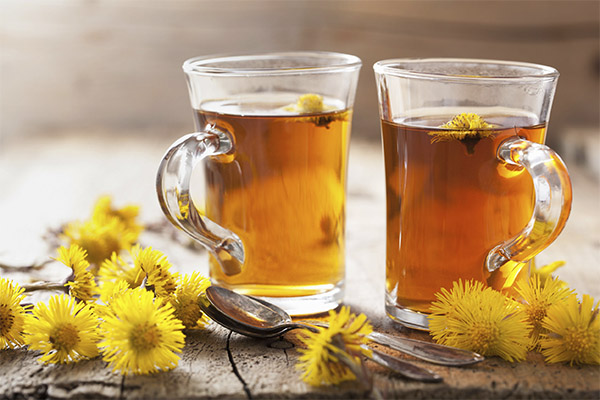
Depending on the expected effect and the treatment regimen of the disease, dandelion tea is consumed in different versions, different doses, as well as the time of day. Before using the tea, be sure to read the instructions. Usually in the instructions write the concentration of the plant (how many spoons, grams should be put in a glass of water), the brewing method (water bath, reception - as a regular tea), cooking time (tentatively the tea is infused from 5 to 15 minutes). The temperature of consumption of the drink for maximum effect is also indicated. But there are also general recommendations, to which it is also better to heed.
- For example, because tea has a pronounced diuretic effect, you should not drink it before an important event or going out.
- For children and nursing mothers, a small concentration of the drink is suitable. Breastfeeding women are advised to take tea at least half an hour before the start of breastfeeding.
- For insomnia tea is taken two hours before bedtime.
- For effective weight loss, the drink is taken with a meal, as it actively starts the intestines.
- Decoctions with a large amount of the plant are taken only by tablespoons, no more than three times a day.
- For a restorative, immunosuppressive effect usually drink tea with honey. The scheme and duration of the course is two weeks, followed by a break of up to three months.
Harm and contraindications
Like any medicine, dandelion has contraindications for use. Before using it, it is better to carefully consider the possibility of side effects. Since the composition of dandelion is rich in a large number of trace elements, vitamins, resins, in some cases, this excess can bring harm to the patient. The main prohibitions on the consumption of the plant:
- The presence of vitamin K can lead to open bleeding. With caution, the drink should be taken after operations, injuries, as well as pregnant women - as it affects the tone of the uterus.
- In acute ulcers, gastritis and inflammation of the stomach, the use of dandelion is excluded.
- In case of stone formation, it is also better to consult a doctor before use.
- Teas from this plant are not to be consumed when taking medicines that have an anti-acid effect.
- Tea should not be drunk with certain antipyretics and antibiotics because of the danger of bleeding or poor absorption of the medicines.
- Consultation with your doctor is necessary for anyone with diabetes, as taking tea from the plant can lead to glycemia.
When and how to harvest dandelion for tea
Due to the large area of distribution of dandelion on the territory of Russia, it is possible to collect and harvest the herb independently. In this case, the main rule is to properly harvest, dry and store the medicinal collection. Improper action at each stage can undermine further health.
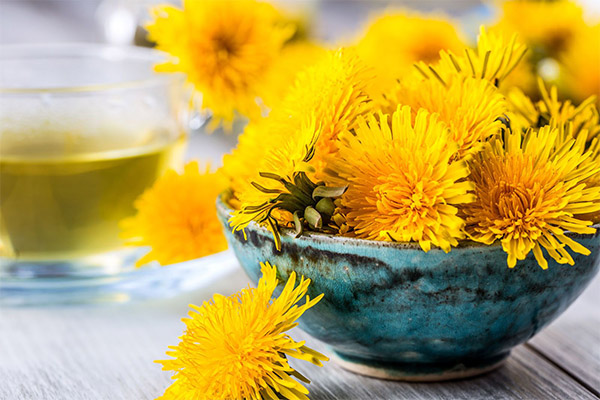
Dandelion is harvested inflorescences, leaves, rhizome. Harvest when the plant has collected most of its beneficial properties. Depending on the part of the plant, there are several harvesting periods.
Inflorescences are harvested during the main flowering period - May, June. Only flowers that have recently blossomed are picked. The flowers are plucked by hand, without the use of knives. In this case, it is also important to collect the inflorescences with pollen.
Leaves are also collected in May, early June, carefully picked by hand, without the use of knives and scissors.
Leaves and inflorescences are stacked on a flat surface to avoid mashing the grass. All raw materials should be washed without insect damage. It is dried without direct sunlight, often tedding.
Dandelion roots are collected in two periods: before flowering (early spring) or in the fall, after the flowering period (September, October). The roots are also washed thoroughly and dried in an oven or a well-ventilated dry place.
The dried harvest is gathered and packed in cloth bags. It is stored in a dry place. Shelf life of the medicinal collection: leaves, inflorescences - 2 years, the roots up to 5 years.
What parts of the plant can be used
As a medicinal raw material for further use, dandelion inflorescences, leaves, root are used. From the roots in most cases, decoctions, alcohol tinctures, ointments, lotion, coffee are made. Inflorescences and leaves are used to make juice, oil, tea, cosmetic lotion.
How to make dandelion tea: recipes
There is a great variety of recipes for making tea from dandelions. For the first acquaintance with this medicinal plant, a few basic, basic recipes can be identified.
- Improving immunity. Take 3 tablespoons of dandelion leaves and roots, pour a liter of boiling water. Cover with a towel to cool slowly and allow to infuse for 10 minutes. You can drink a cup of tea before each meal.
- Weak diuretic. Take fresh dandelion leaves during flowering (May-early summer) at the rate of one teaspoon of mixture per cup, tear them with your hands into small pieces, pour boiling water over them. Let stand for 10 minutes, strain hot. This tea can be drunk hot or cold. It is rich in trace elements and fatty resins and is ideal as an immuno-suppressant and mild diuretic. To sweeten it, you can add honey, lemon zest.
- Body Strengthening. 6 inflorescences of dandelion brew 300 mm of boiling water. Allow to infuse for 5-10 minutes. Strain, add honey to taste. Such a drink has a pleasant golden color, and you can use it several times a week.
- Slimming. A teaspoon of the roots of the plant to brew a mug of boiling water. Let stand for 30 minutes, strain. Take with meals. Tea activates the metabolism, acts as a laxative, diuretic.
- Treatment of joints. Take 5 inflorescences of dandelion, pour cold water so that the raw material is completely covered. Put the container on the fire, let the water boil, boil the raw material for 20 minutes. Strain the cooled tea, add lemon if desired. Drink with pain in the joints to alleviate the condition.
Interesting facts about dandelions
Talking about the medicinal virtues of this sunny plant, you can touch on a few interesting facts about it.
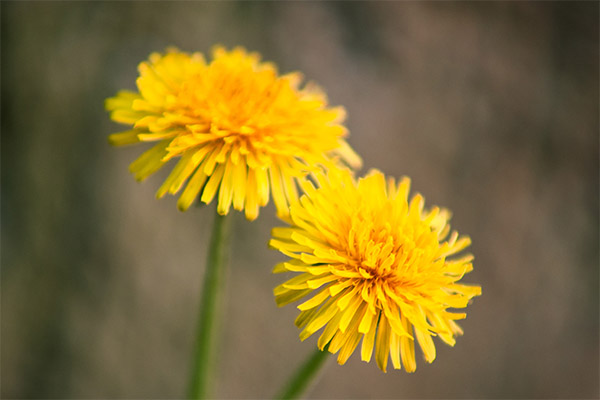
The consumption of dandelion is widely used in cooking. In Europe (France, Belgium, Germany, Italy) the plant is cultivated as a variant of green leaf lettuce. In India, entire plantations are devoted to it. The most common dishes in cooking:
- A variety of salads with fresh dandelion leaves. The salad is prepared on the basis of the leaves, then eggs, herbs, peppers, vegetables are added as desired by the master chef. Mayonnaise, butter or sour cream serve as dressing.
- Pickled dandelion. Leaves and inflorescences are pickled. Then added to salads, soups.
- Jam. Young dandelion inflorescences are used to make a yellow, sunny jam. During respiratory diseases, it is a success. Also from the flowers of the plant are made candied fruits.
- Coffee. The ground roots of the dandelion are used to make coffee. Before use, the roots of the plant are roasted until golden, which makes the taste of dandelion similar to chicory. This coffee is drunk with the addition of cream and cinnamon. During the war it was widely used by the German troops as a substitute for classic coffee.
- Cider, wine, dandelion beer. This is a traditional classic drink in Great Britain.
- Juice. Dandelion leaf juice is very popular. The benefits of the drink is not officially proven, but it is widely used for anemia, avitaminosis. When combined with black radish juice, it has a positive effect on the body when inflammation of the liver, cough. In folk medicine, it is prescribed together with carrot juice for rickets in young children, to treat fractures and fast bone adhesion. For the elderly it is prescribed in the treatment of joint diseases, as a prevention of bone fractures. But it is important to remember that the milky juice of dandelion in large doses can cause detoxification, a departure of the body.
As an interesting information about this plant, there are several other facts:
- Dandelion has long been bred for the production of rubber, as it contains rubber. At this point in time, special trees are used for rubber production, but developments using dandelion sap in this direction have not been completed.
- In agriculture, the dandelion is considered one of the most "noxious" weeds. It has been found to have a great ability to regenerate and rebuild a population from even the smallest piece of rhizome. As a weed, the dandelion is indestructible.
- The seeds of the plant can travel hundreds of miles through the air before germinating in the soil.
- In the Caucasus, there is a species of dandelion whose petals are bright red in color.
- On the Kola Peninsula, a type of white dandelion grows. It has white petals of inflorescences with a snow-white middle inside.
- Dandelions are sometimes called "nature's sundial." They open their inflorescences at 6 a.m. and close at 3 p.m. sharp.
- In the United States, we celebrate Dandelion Day in early May. On the first Saturday in May, the state of Ohio cooks dandelion dishes and decorates clothes with them.
- In China, the plant is officially recognized as a vegetable because it is the basis for the preparation of many dishes.
«Important: All information on this site is provided for informational purposes only information on this site is provided solely for educational purposes. Please consult with your health care professional before applying any recommendations. specialist. Neither the editors nor the authors are liable for any possible harm caused by materials."

